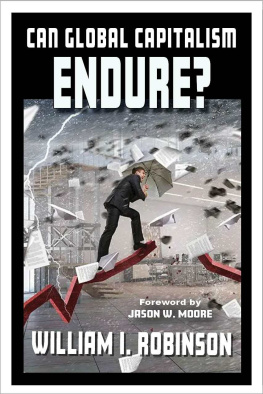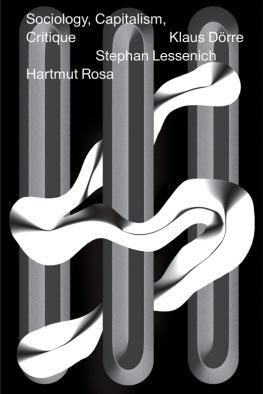WHAT PEOPLE ARE SAYING ABOUT
The Writing on the Wall
This passionate collection of essays by Anselm Jappe, a critique of value theorist, is a significant contribution to the critical analysis of contemporary capitalism. Resolutely anti-capitalist, the author reminds us that by demanding submission of all aspects of life to market relationships, the system inexorably leads to the destruction of human communities and the environment. Michael Lwy, Alternative Libertaire
Contact with reality makes a theory stronger and the importance of Anselm Jappes book is that it allows us to measure the explicatory power of the critique of value when it is applied to a number of different subjects, from [] political life to contemporary art. The central chapter, where he analyses the subprimes crisis, is the most striking. Here Jappe reminds us of the founding paradox of capitalism as originally formulated by Marx: capitalism realises profits by exploiting human labour, yet every increase in productivity made possible by automation and technology reduces human input into the goods that are produced.
Eric Aeschimann, Libration
First published by Zero Books, 2017
Zero Books is an imprint of John Hunt Publishing Ltd., Laurel House, Station Approach, Alresford, Hants, SO24 9JH, UK
www.johnhuntpublishing.com
www.zero-books.net
For distributor details and how to order please visit the Ordering section on our website.
Text copyright: Anselm Jappe 2016
ISBN: 978 1 78535 581 3
978 1 78535 582 0 (ebook)
Library of Congress Control Number: 2016951894
All rights reserved. Except for brief quotations in critical articles or reviews, no part of this book may be reproduced in any manner without prior written permission from the publishers.
The rights of Anselm Jappe as author have been asserted in accordance with the Copyright, Designs and Patents Act 1988.
A CIP catalogue record for this book is available from the British Library.
Design: Stuart Davies
Printed and bound by CPI Group (UK) Ltd, Croydon, CR0 4YY, UK
We operate a distinctive and ethical publishing philosophy in all areas of our business, from our global network of authors to production and worldwide distribution.
CONTENTS
I would like to thank John McHale and Michael DeSocio for their help with this translation.
Alastair Hemmens
Preface
The by now patently obvious decline of capitalism does not always provide confirmation of the critiques that its traditional adversaries have levelled at it. On the contrary, it appears that these old antagonists are entwined en route towards the same dustbin of history. The question of social emancipation is beginning to be posed in a new way. It must be rethought. This is the purpose of the critique of value that the German journals Krisis and Exit! and their principal author Robert Kurz, as well as Moishe Postone in the United States, have been elaborating since the 1980s. In 2003 I published Les Aventures de la marchandise: Pour une nouvelle critique de la valeur, in which I tried to summarise the critique of value for the French-speaking public. The book begins with an analysis of the basic concepts of Marxvalue, abstract labour, money, the commodityin order gradually to arrive at some considerations on the current state of the world and at some form of polemic on the basis of other critiques of contemporary capitalism.
In the years that followed, I have put that theory to the test by using it as an interpretive framework in order to work out whether it is more effective than other perspectives as an approach to understanding todays world. The Writing on the Wall contains ten of my contributions to the debate in France, published between 2007 and 2010. While these texts were written on different occasions and often on a given theme, it is true nonetheless that they all deal with the same questions, but without going over the same ground too much. They may be read separately because they were written separately, and because each of them contains some material that explains its theoretical assumptions, that is, the critique of value and commodity fetishism. In this sense, they also make up a kind of introduction to the critique of value for those who have not read Les Aventures In fact, each text is made up of a brief summary, depending on the topic it addresses, of a different aspect of value critique: crisis theory, the structure of the commodity, fetishism, etc. I decided it was better to leave these summaries within their separate articles, rather than to combine them into some kind of introductory text, which would have unravelled them, made it impossible to read them separately, and at the same time obliged the reader to cross the desert of preliminary concepts. Except for The Cat and the Mouse, all these articles were originally written in French and published in French journals. All of them have been specially revised for this book.
Essentially, these texts analyse the decomposition of contemporary capitalism and the reactions this decomposition engenders. The first part, pars destruens, includes four articles that appeared in the journal Lignes. The Princesse de Clves Today appeared in November 2007 in issue no. 23-24 of the same journal devoted to the theme Twenty Years of Political and Intellectual Life. Its title refers to comments by Nicolas Sarkozy, who, back when he was running for the French presidency, had deemed it scandalous that questions about Madame de La Fayettes book should be featured in civil service entrance examinations. His statements triggered a wave of indignation and sarcasm, and La Princesse became, more than three centuries after her fictional exploits, a symbol of the rebellion against state educational policy. Politics without Politics was published in issue no. 25 (March 2008), which was on the theme of Political Decomposition/Recomposition. Violence to What End? was published in issue no. 29 (May 2009), which was devoted to the theme On Violence in Politics, following the Tarnac Affair, which I also discuss in that article. The Writing on the Wall was published in issue no. 30 (October 2009), the theme of which was Crisis as Mode of Governance. This article was disseminated variety, the hounding of city traders, and critiques focussing exclusively on high finance; but also proposals for a return to politics and class struggle, as well as talk of regenerative violence that would see capitalist barbarism defeated by its own weapons. These kinds of reactions to the crisis are filed here under the general term populism, for despite their radical cachet, none of them really criticises the foundations of capitalist production. They are much more focussed on tinkering with the system, looking for scapegoats, reigniting antagonisms that have in actual fact collapsed along with capitalism itself, or descending into bluster.
The first section of the book could have been given the title No, just as the second partthe pars construenscould have been titled Maybe. In the latter I examine some of the recent responses to the obvious impasse in which capitalist society finds itself and which, from the point of view of a radical critique of commodity society, merit some attention. For despite, at least from a distance, serious limitations here and there, these approaches could serve to point the way towards a real supersession of capitalist society. They therefore make up what is called a critical dialogue. The Dark Side of Value and the Gift, published in issue no. 34 of the














